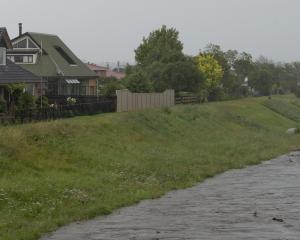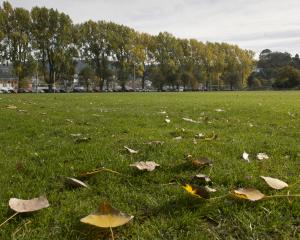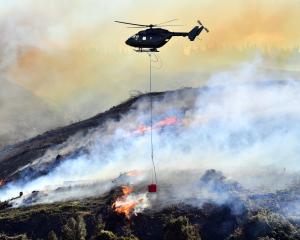New rental rules announced yesterday are better suited to Auckland's booming property market than Dunedin's ageing rental stock, a social sector leader warned last night.
But the requirement to retrofit rentals with underfloor and ceiling insulation was better than nothing, Methodist Mission chief executive Laura Black said.
Housing Minister Nick Smith announced plans yesterday to strengthen residential tenancy laws, including requirements for landlords to provide smoke alarms and insulation, and declare the standard of insulation on tenancy agreements.
''The new law will require retrofitting of ceiling and underfloor insulation in rental homes over the next four years,'' Dr Smith said.
''The health benefits of this will be reduced hospitalisations from circulatory and respiratory illnesses, reduced pharmaceutical costs, and fewer days off work and school.''
Ms Black would have preferred a warrant of fitness scheme, which would have addressed the deficiencies of Dunedin's rental housing stock.
Much of it had basic water-tightness and ventilation shortcomings.
A lack of curtains was also a problem.
''Here in Dunedin I think it's going to be complex because I think there are going to be landlords with properties that are going to be over-capitalised [with the insulation].
''They're in such poor condition. If you look at rental stock in South Dunedin, some of that stuff really is pretty grotty.''
Some tenants in Dunedin were fashioning makeshift double glazing by melting bubble-wrap on to windows with a hairdryer, Ms Black said.
Because the population was static, little new housing was being added.
''It does seem that this housing policy is tailored for the way the market for rental works in Auckland or Christchurch, rather than ... the rest of the country.''
In announcing the changes, Dr Smith said: ''This package is a more pragmatic and efficient way of improving housing standards than a housing warrant of fitness scheme.
''Such a scheme would cost $100 million per year, or $225 per house for inspections alone, and these costs would be passed on to tenants in rents.''
Presbyterian Support Otago chief executive Gillian Bremner supported the measures but had questions about how it would work in practice.
Just what constituted insulation was unclear. Many houses had old insulation, which might need to be replaced, she said.
''I think that the suggestion of a warrant of fitness was a bridge too far.
''In the middle of winter, in probably the coldest week of the year, it's probably a really good idea.''
Otago Property Investors Association president Wendy Bowman said 95% of the organisation's members had insulated their rental properties.
''We support the Government in bringing in the minimum standards of insulation and smoke alarms.''
The association recently acquired 200 photoelectric smoke alarms to be on-sold at cost price to members.
They worked for 10 years, and could not be dismantled.
Landlords who provided smoke alarms found that some tenants took out the batteries, she said.
Ms Bowman did not expect the changes to lead to rent increases, saying it was a competitive market.
Dunedin Mayor Dave Cull said the new rules were a good start.
It was sensible not to impose a ''huge raft'' of conditions but he would like to see ''a bit more'' in respect of heating and weather-tightness regulations.
Otago University Students' Association president Paul Hunt said the announcement would benefit students, but he needed to look more closely at it before commenting further.
''We're obviously very pleased that there is a requirement for flats and rentals to be insulated, which means that students will hopefully have healthier environments to live in.''
The insulation rule applies from July for Government-subsidised social housing, and from July 2019 for all other rentals including boarding houses.
Enforcing the new standards relied on tenants making a complaint about the state of their rental accommodation.
Exceptions would include houses where it was physically impossible to retrofit insulation.
''Regulations will make landlords responsible for ensuring an operational smoke alarm is in place, and tenants responsible for replacing batteries or notifying landlords of defects,'' Dr Smith said.
''The Ministry of Business, Innovation and Employment will have new powers to investigate and prosecute landlords for breaking tenancy laws as part of these reforms, particularly where there is risk to the health and safety of tenants.
''The changes will also ensure tenants can take concerns to the Tenancy Tribunal without fear of being evicted for doing so.''
In another change, landlords will be able to take control of abandoned properties faster than the law allowed now.
A new 10-day process would be introduced to enable ''re-tenanting'' of abandoned properties.
At present, the process takes up to six weeks.
''These reforms are to be supported by a $1.5 million information campaign aimed at improving compliance with existing and new tenancy law requirements,'' Dr Smith said.
- Eileen Goodwin & NZME
The updates
• All rental properties must be insulated by July 2019, although exemptions apply to properties where it is physically impractical to retrofit insulation.
• Smoke alarms must be installed in all rentals from July 2016, but tenants will be responsible for replacing batteries and notifying landlords of defects.
• New powers to prosecute landlords for breaking tenancy regulations, particularly where there is risk to tenants' health and safety.
• The changes ensure tenants can take concerns to the Tenancy Tribunal without fear of retaliatory evictions.












